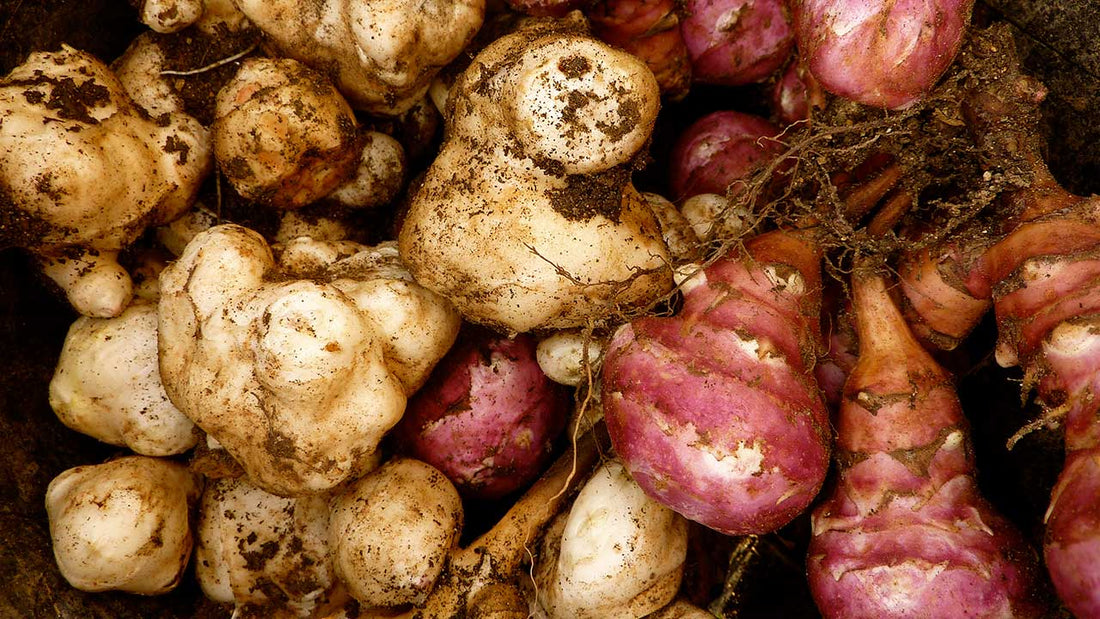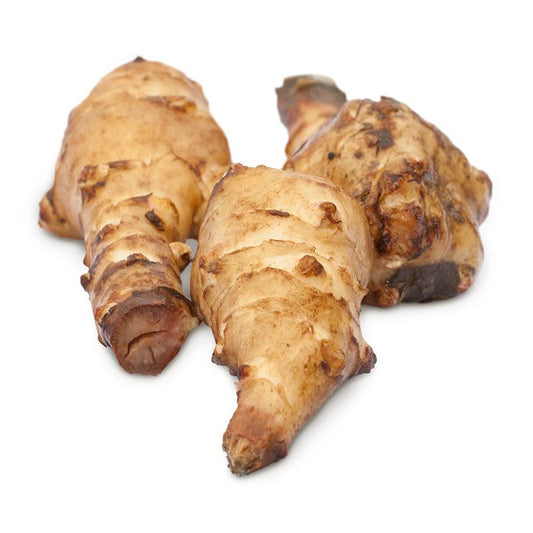 Want an easy to grow, unusual vegetable? Try Jerusalem artichokes. What is a Jerusalem artichoke?
Want an easy to grow, unusual vegetable? Try Jerusalem artichokes. What is a Jerusalem artichoke? Jerusalem artichokes (
Helianthus tuberosus) are really sunflowers with fat, edible roots. They're also popularly known as Sun Chokes.
Growing Jerusalem Artichokes
Plant
our Jerusalem artichoke tubers in the spring and stand back! They are hardy to USDA zone 2 and grow best in the cooler two-thirds of the U.S. Watch the plants grow to 10 feet tall and 6 feet across, starred with yellow flowers. Happiest in a sunny spot and well-drained soil with good tilth, Jerusalem artichokes are vigorous and will usually win any battle with a weed. Some gardeners consider them weeds because of their willingness to return each year. Dig and enjoy the tuberous roots throughout the summer.
In our video on fall care for perennial vegetables, Tricia shows how to dig them up completely after the first few frosts.
How to Control the Spread of Jerusalem Artichokes
* Snip off the flowers and use them indoors in arrangements, before they drop their seeds. * Dig up most of the plants in late fall. If you are able to harvest through a mild winter, be sure to dig up most of the plants by spring to keep them from taking over your garden.
Recipes for Jerusalem artichokes
This vegetable is easier on diabetics than are potatoes; when we digest Jerusalem artichokes they convert to fructose instead of glucose, which metabolizes more slowly.
Raw: Scrub them clean with a vegetable brush, but don't peel them. The texture is like a water chestnut, so they are good sliced into salads.
Preserved: Pickle them yellow with turmeric and mustard seeds.
Cooked: Bake them like potatoes, for a fluffy texture and a nuttier flavor than potatoes.
For more information see a
long article by Purdue University.
Tall photo courtesy of Kjetil Lenes
 Want an easy to grow, unusual vegetable? Try Jerusalem artichokes. What is a Jerusalem artichoke? Jerusalem artichokes (Helianthus tuberosus) are really sunflowers with fat, edible roots. They're also popularly known as Sun Chokes.
Want an easy to grow, unusual vegetable? Try Jerusalem artichokes. What is a Jerusalem artichoke? Jerusalem artichokes (Helianthus tuberosus) are really sunflowers with fat, edible roots. They're also popularly known as Sun Chokes.

 Want an easy to grow, unusual vegetable? Try Jerusalem artichokes. What is a Jerusalem artichoke? Jerusalem artichokes (Helianthus tuberosus) are really sunflowers with fat, edible roots. They're also popularly known as Sun Chokes.
Want an easy to grow, unusual vegetable? Try Jerusalem artichokes. What is a Jerusalem artichoke? Jerusalem artichokes (Helianthus tuberosus) are really sunflowers with fat, edible roots. They're also popularly known as Sun Chokes.



1 comment
The ones I’ve grown (with limited success – too far north) have spread via tubers left in the ground.
Am going to give them another try by planting them early indoors in grow bags and then moving the bags outside after last frost when temps warm.
Using Wal Mart shopping bags to grow in – at .50 each they are cheap, work well, and are reusable…fwiw.